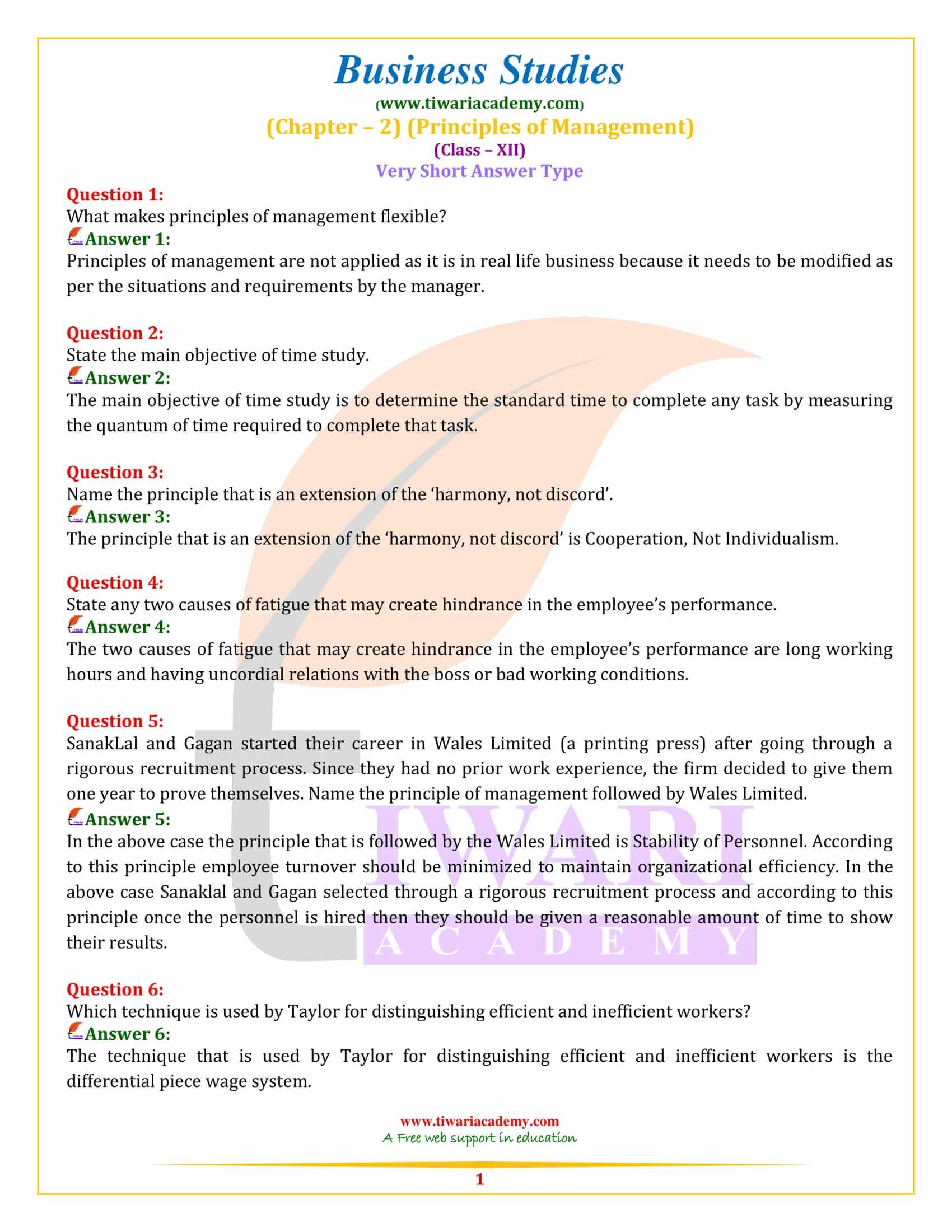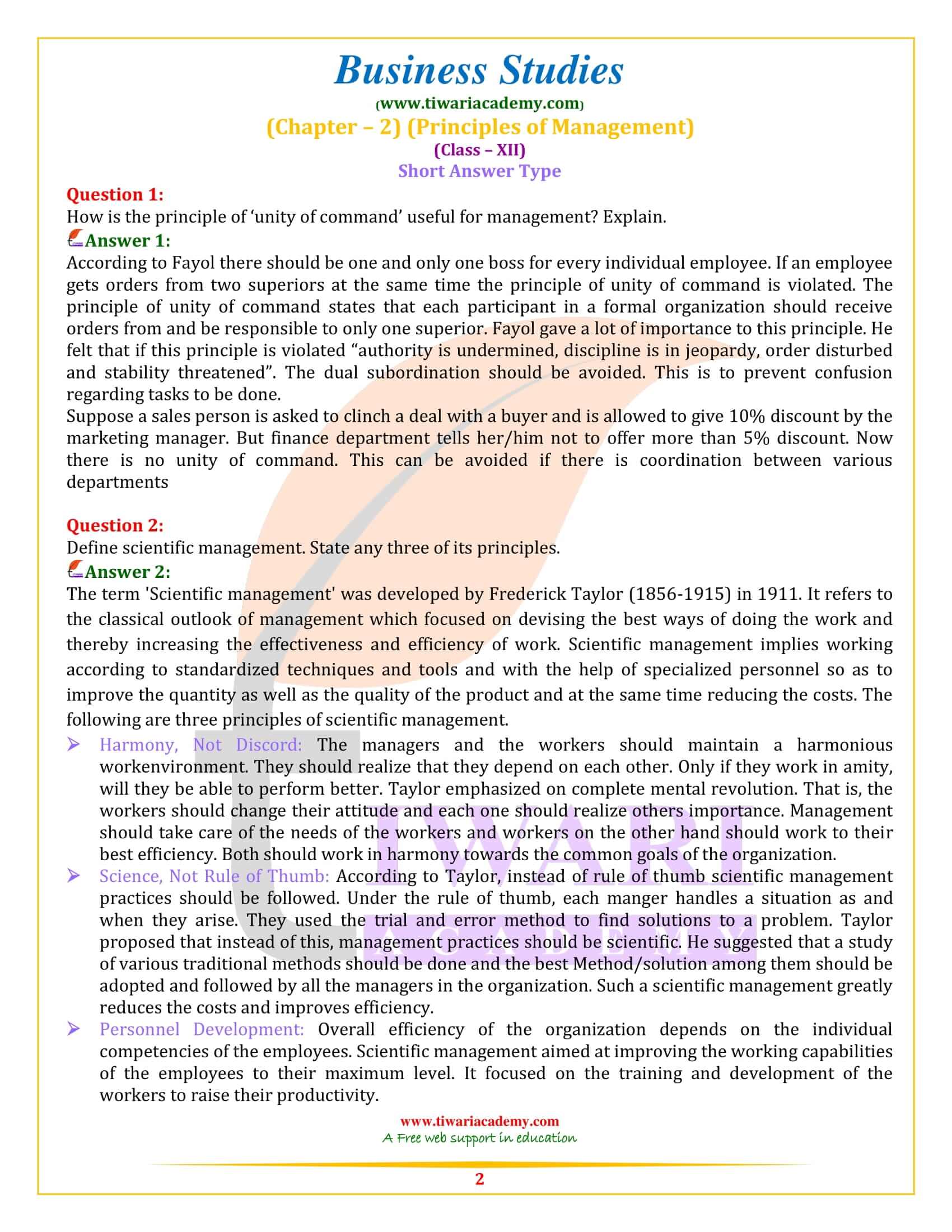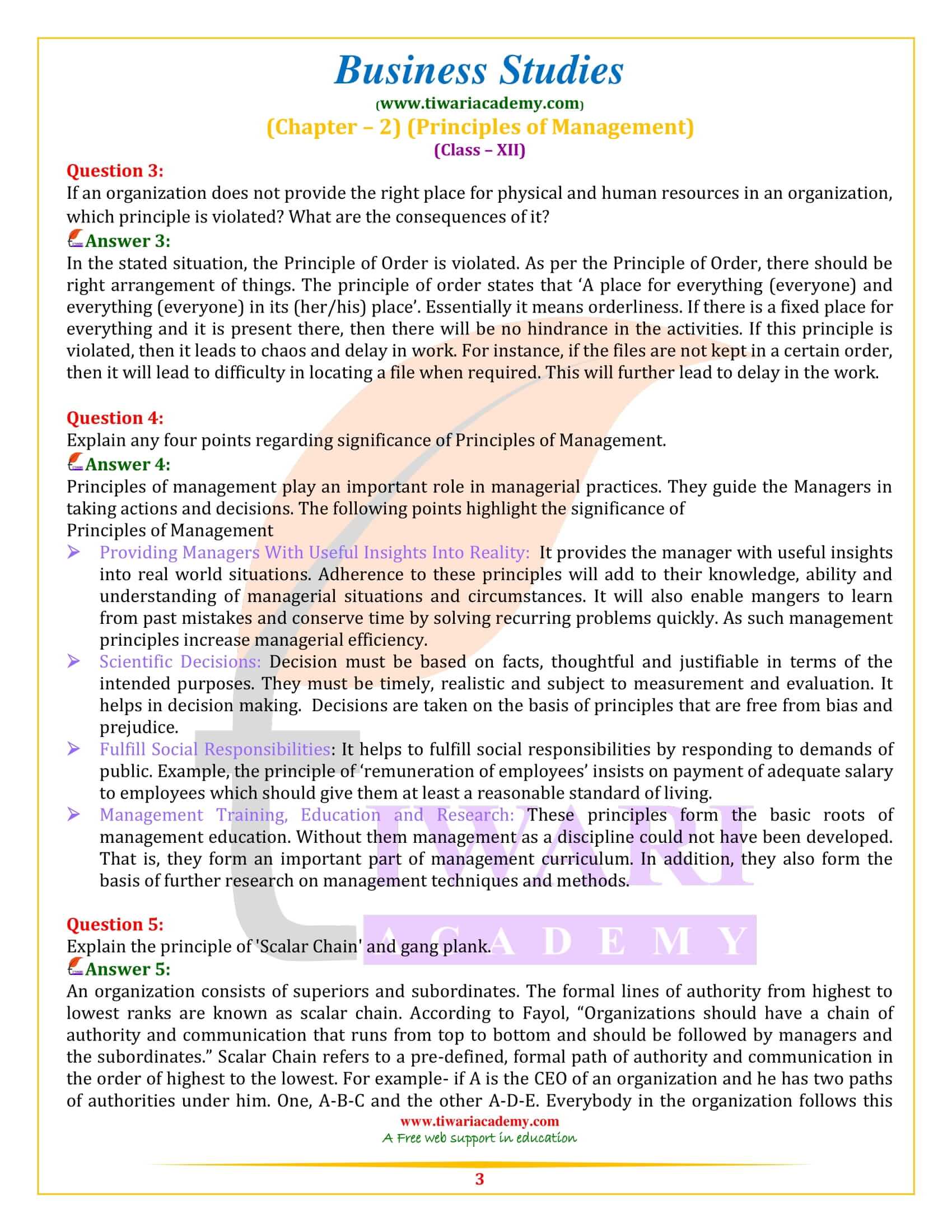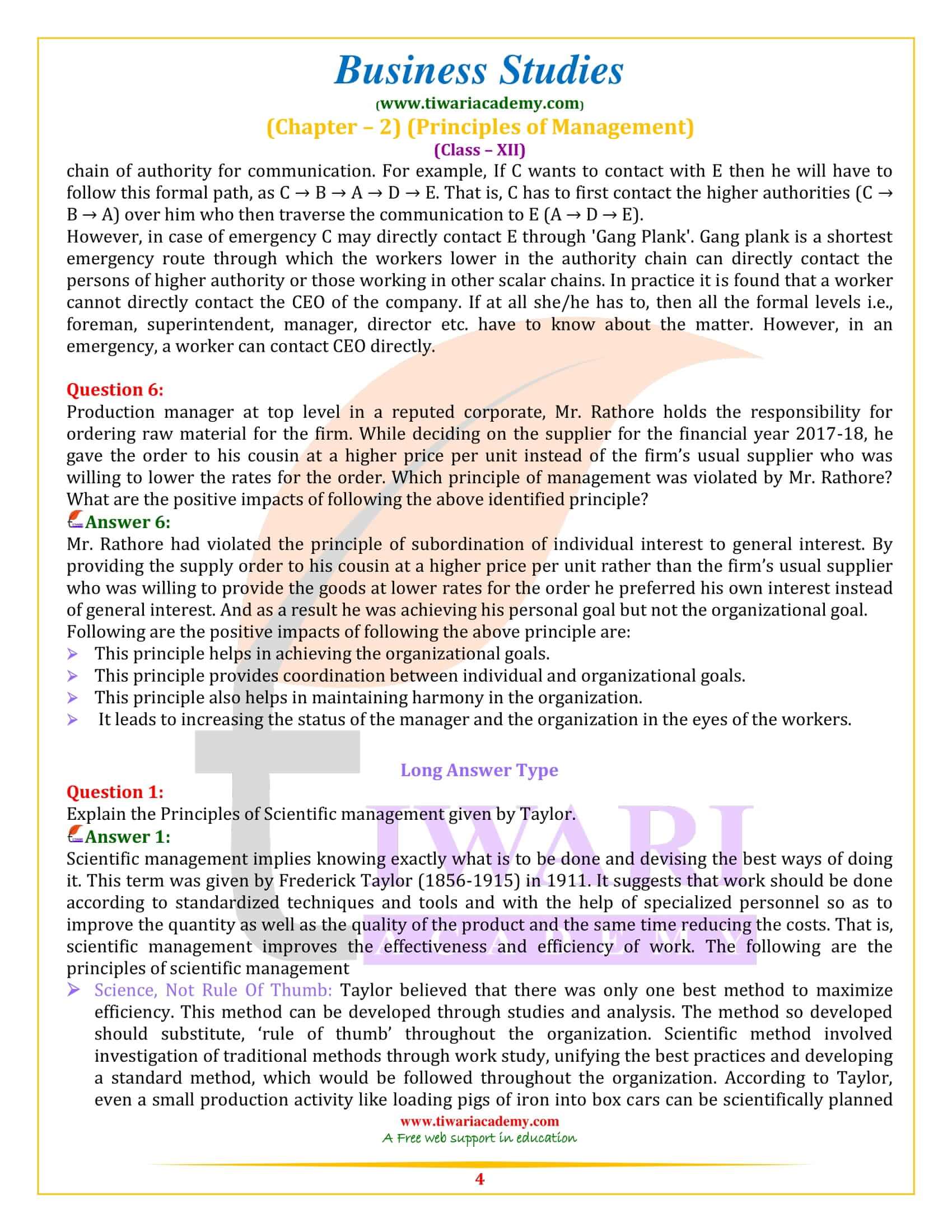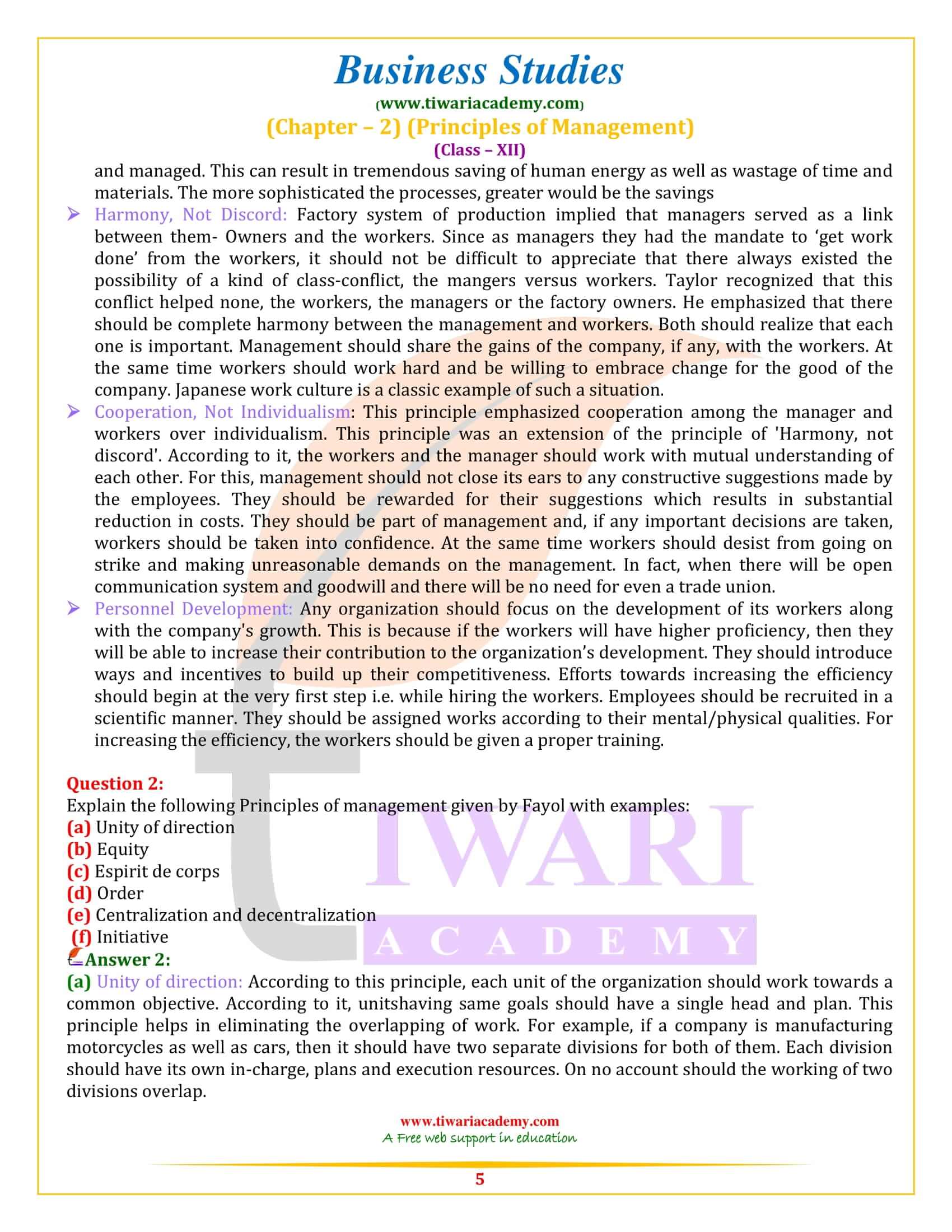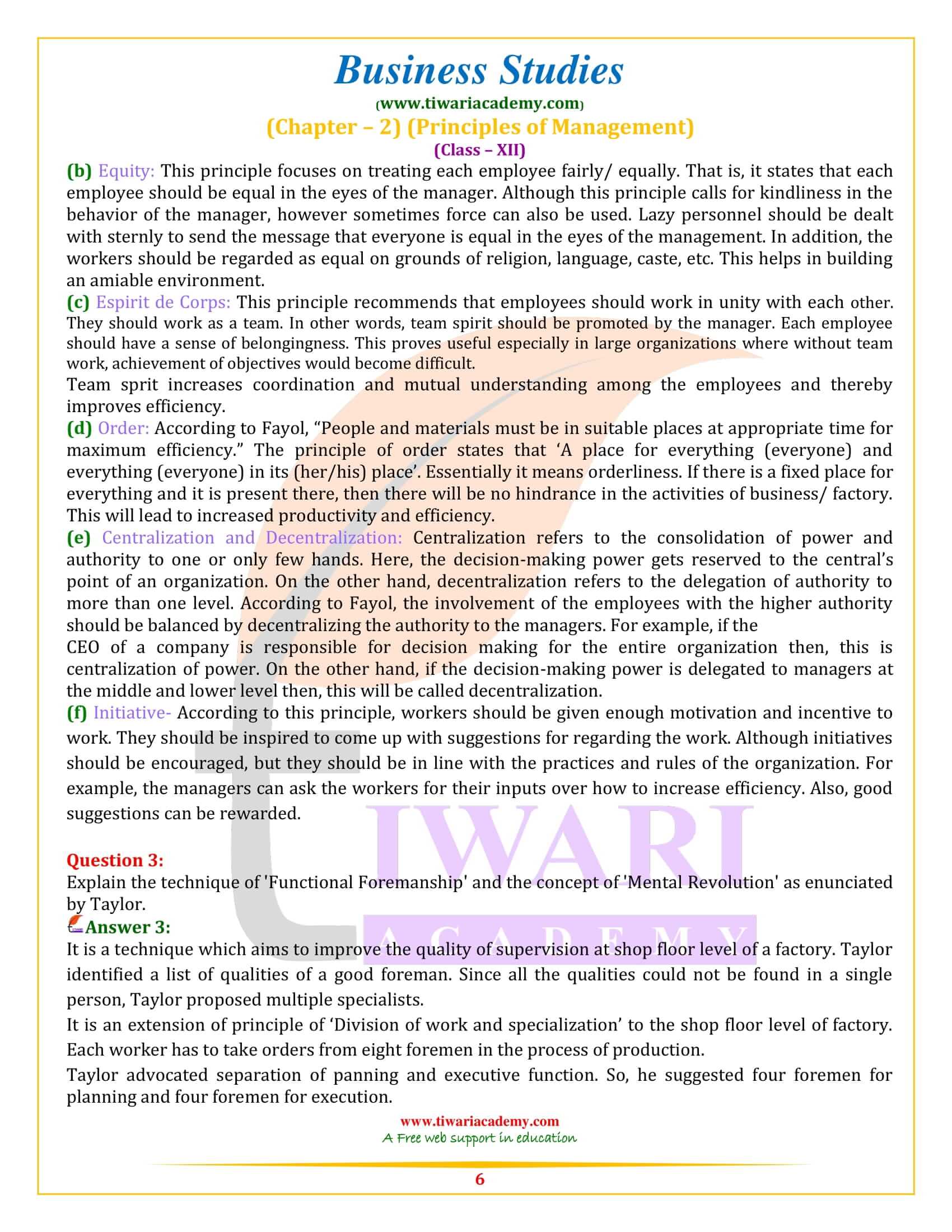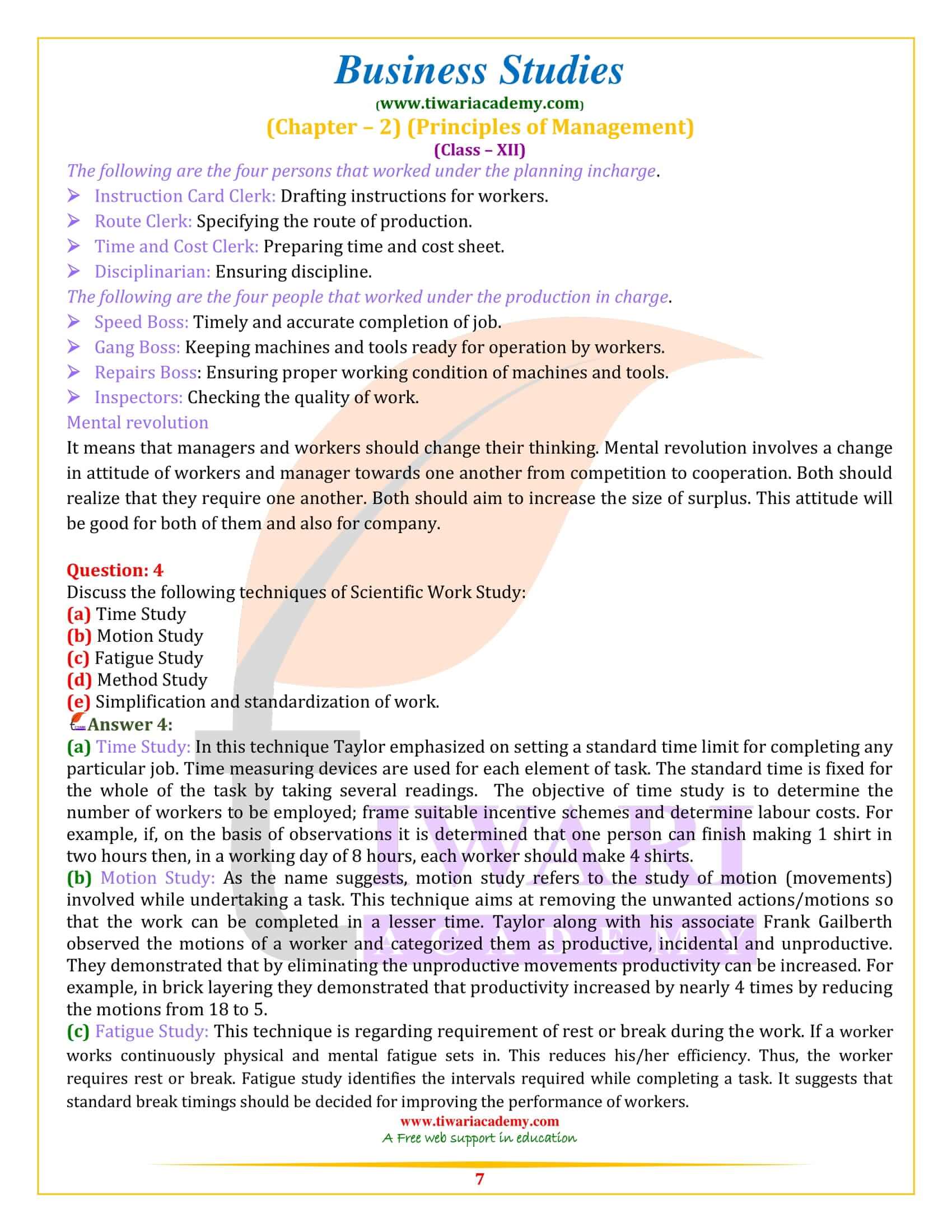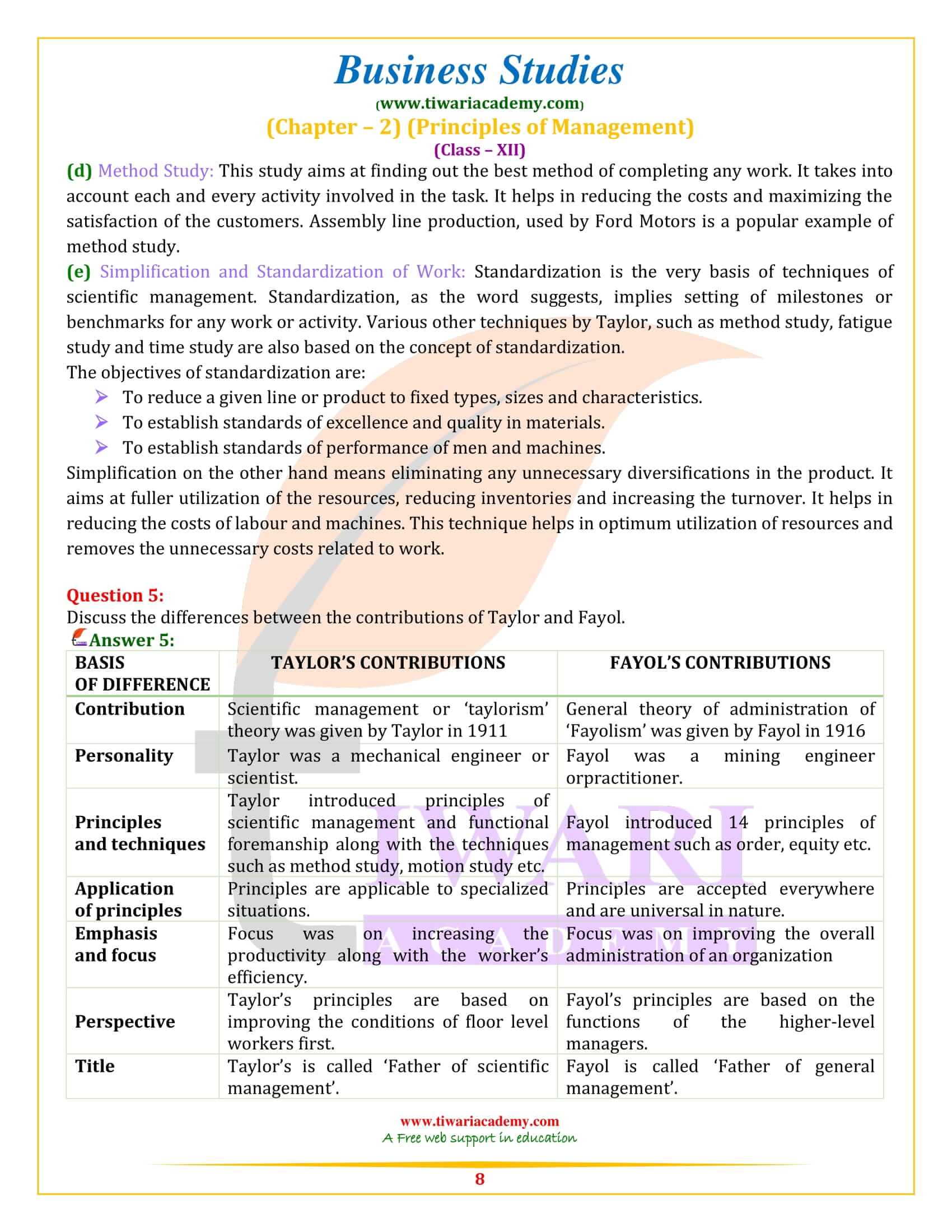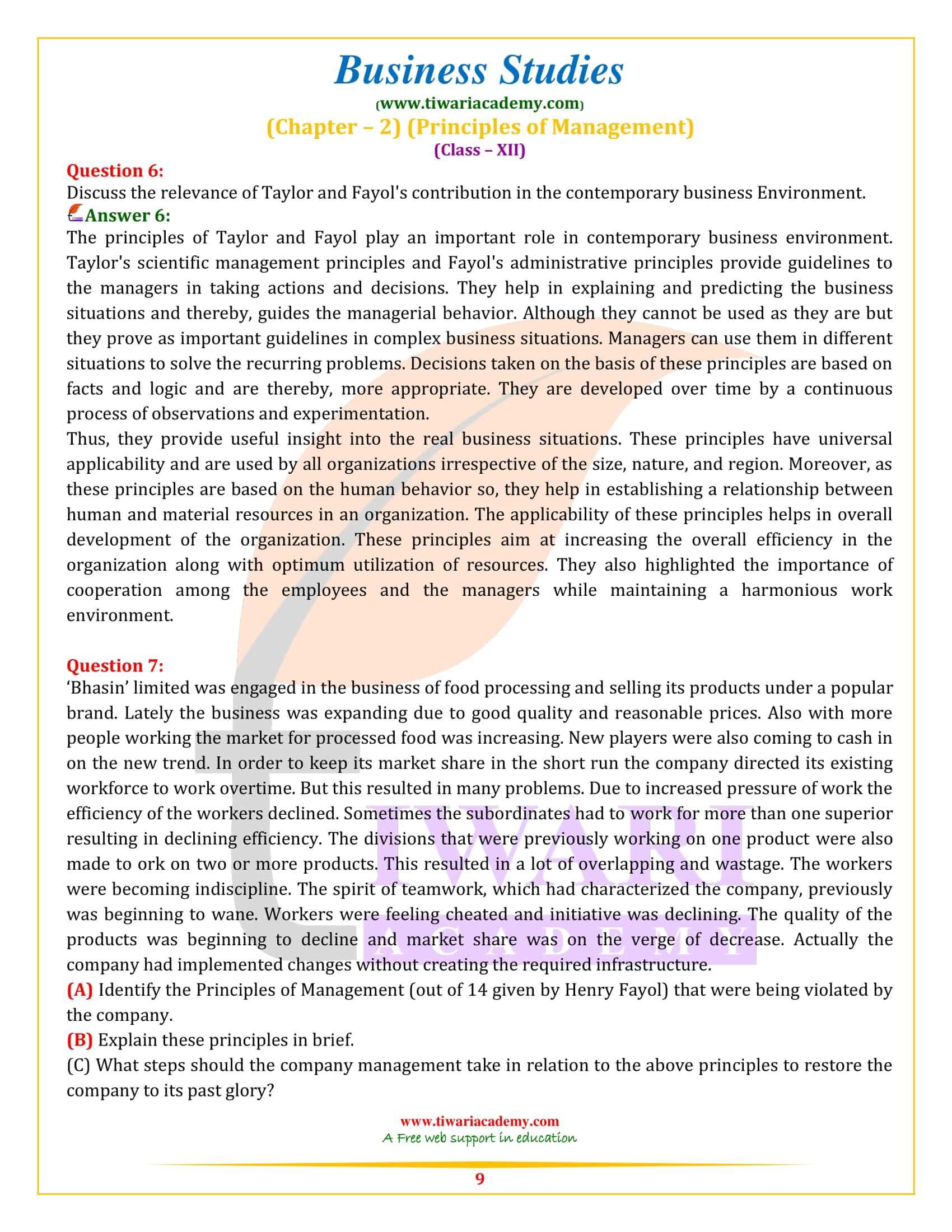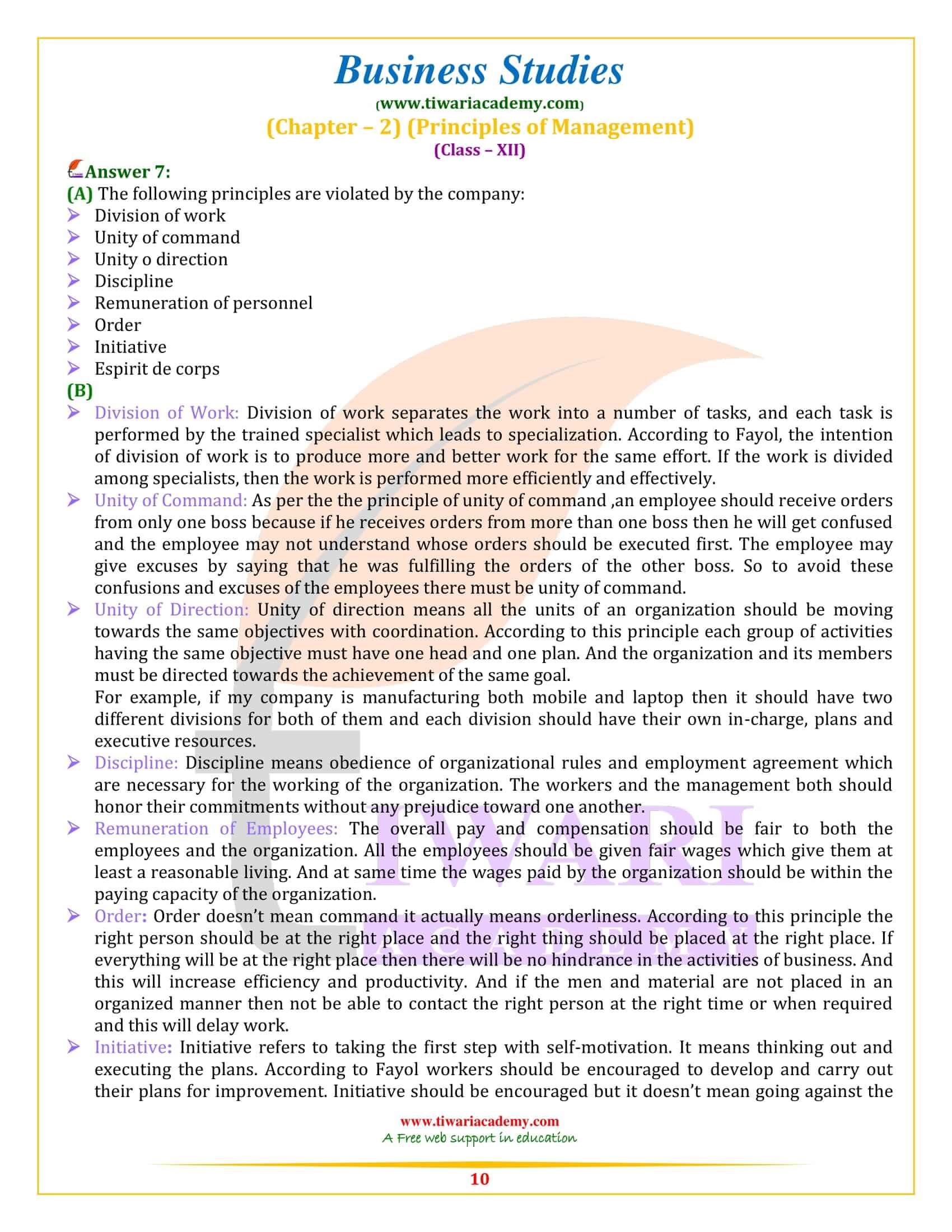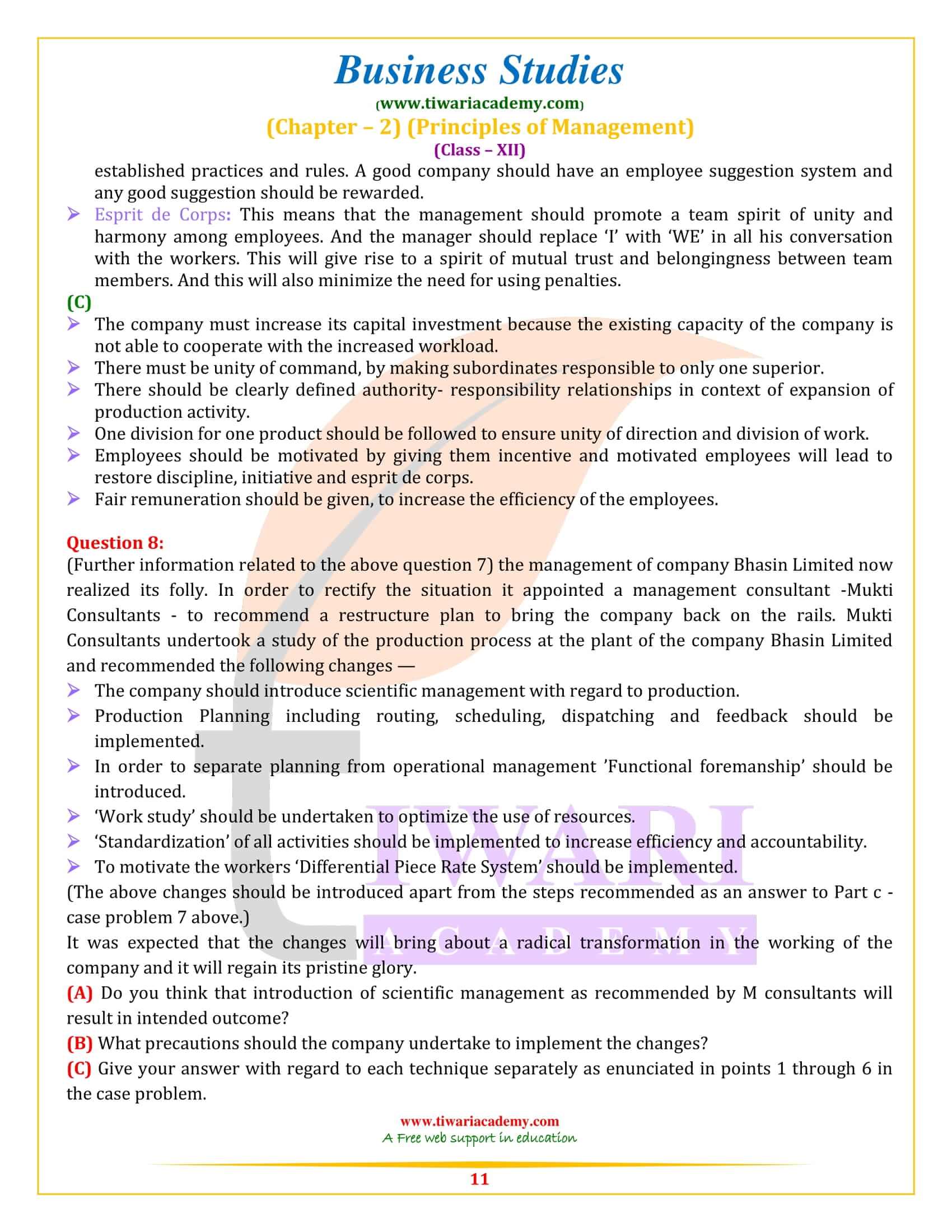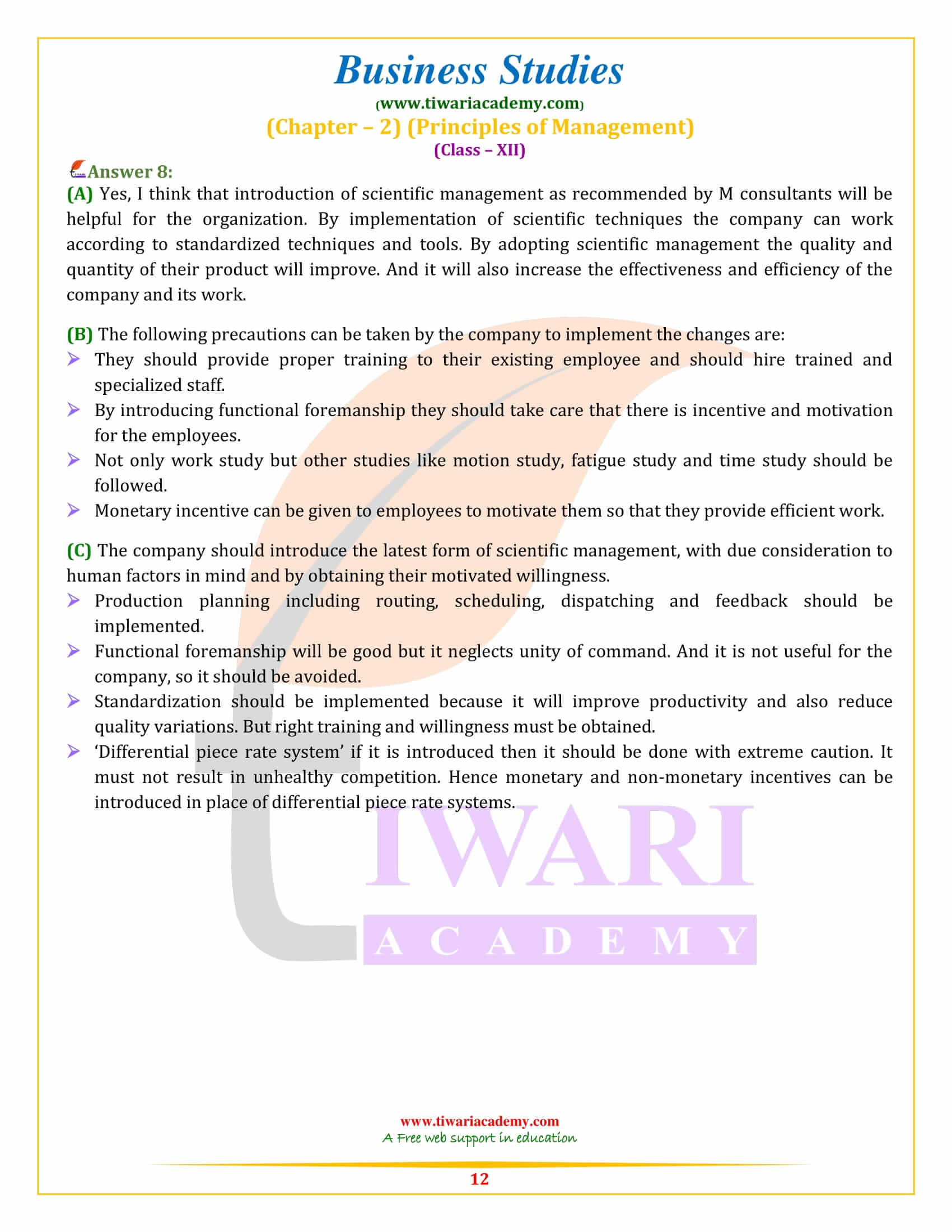NCERT Solutions for Class 12 Business Studies Chapter 2 Principles of Management updated for CBSE session 2025-26. Get here all very short, short answer type and long answers questions point wise to prepare for exams. All the answers are written step by step format.
Main Points about Viva Voice for Class 12 Business Studies
NCERT Solutions for Class 12 Business Studies Chapter 2
Class 12 Business Studies Chapter 2 NCERT Solutions
- Class 12 Business Studies Chapter 2 Solutions
- Class 12 Business Studies Chapter 2 MCQ
- Very Short Answers Questions Chapter 2
- Short Answers Questions Chapter 2
- Long Answers Questions Chapter 2
- Study Material English Medium
- NCERT Book Chapter 2 in English
- Study Material Hindi Medium
- NCERT Book Chapter 2 in Hindi
- Class 12 Business Studies NCERT Solutions
- Class 12 all Subjects NCERT Solutions
Very Short Answer Type
Class 12 Business Studies Chapter 2 Very Short Answers Type Questions
What makes principles of management flexible?
Principles of management are flexible as they adapt to dynamic business environments, ensuring managers can respond effectively to changes without being rigidly bound to traditional methods.
What is the main objective of time study?
The main objective of time study is to determine the optimum time required to perform a task efficiently, thereby aiding in setting standards and improving productivity.
Which principle extends the concept of ‘harmony, not discord’?
The principle of ‘Cooperation, not Individualism’ extends the concept of ‘harmony, not discord’ by emphasizing teamwork and mutual goals over individual conflict.
What causes fatigue that may hinder employee performance?
Factors such as long working hours, inadequate rest breaks, and high job stress can cause fatigue, hindering an employee’s efficiency and health.
Which principle was followed by Wales Limited in their recruitment process?
Wales Limited followed the principle of ‘Stability of Tenure of Personnel,’ giving new hires time to prove their capabilities and enhance job security.
What technique does Taylor use to distinguish between efficient and inefficient workers?
Taylor uses the Differential Piece Rate System to distinguish between efficient and inefficient workers, rewarding those who perform above standard levels.
How is Unity of Command useful to management?
Unity of Command ensures that each employee receives orders from only one superior, reducing confusion and conflicts, thereby enhancing clarity and authority in the organizational structure.
Define scientific management and state three of its principles.
Scientific management optimizes efficiency and productivity through scientific methods. Three principles include the science of task planning, scientific selection and training of workers, and fostering cooperation between managers and workers.
What principle is violated when physical and human resources are not properly placed?
The violation of the Order principle occurs when resources are misplaced, leading to inefficiency and potential chaos in operations.
What makes principles of management flexible?
Principles of management are not applied as it is in real life business because it needs to be modified as per the situations and requirements by the manager.
State the main objective of time study.
The main objective of time study is to determine the standard time to complete any task by measuring the quantum of time required to complete that task.
Name the principle that is an extension of the ‘harmony, not discord’.
The principle that is an extension of the ‘harmony, not discord’ is Cooperation, Not Individualism.
State any two causes of fatigue that may create hindrance in the employee’s performance.
The two causes of fatigue that may create hindrance in the employee’s performance are long working hours and having uncordial relations with the boss or bad working conditions.
SanakLal and Gagan started their career in Wales Limited (a printing press) after going through a rigorous recruitment process. Since they had no prior work experience, the firm decided to give them one year to prove themselves. Name the principle of management followed by Wales Limited.
In the above case the principle that is followed by the Wales Limited is Stability of Personnel. According to this principle employee turnover should be minimized to maintain organizational efficiency. In the above case Sanaklal and Gagan selected through a rigorous recruitment process and according to this principle once the personnel is hired then they should be given a reasonable amount of time to show their results.
Which technique is used by Taylor for distinguishing efficient and inefficient workers?
The technique that is used by Taylor for distinguishing efficient and inefficient workers is the differential piece wage system.
Short Answer Type
Class 12 Business Studies Chapter 2 Important Question Answers
Explain the significance of management principles with four points.
Management principles provide guidance for decision-making, promote efficiency, help in adapting to changes, and facilitate the achievement of both personal and organizational goals.
Describe the ‘Scalar Chain’ principle and its modification, the gang plank.
The ‘Scalar Chain’ principle describes a clear line of authority from top to bottom. The gang plank is a modification that allows direct communication between employees on the same level in emergencies or special circumstances, bypassing the chain.
Which principle did Mr. Rathore violate, and what are the positive impacts of adherence to this principle?
Mr. Rathore violated the ‘Equity’ principle by favoring his cousin. Adherence to equity promotes fairness and trust within the organization, leading to improved morale and productivity.
What are the principles of scientific management by Taylor?
Taylor’s principles include developing a science for each element of work, scientifically selecting and developing workers, and fostering an intimate, cooperative atmosphere between management and workers.
Describe Fayol’s ‘Unity of Direction’ principle.
Fayol’s ‘Unity of Direction’ principle states that activities with the same objectives should be directed by one manager using one plan, enhancing organizational efficiency.
What does the ‘Equity’ principle by Fayol entail?
Fayol’s ‘Equity’ principle involves managing employees with kindness and justice, which promotes loyalty and devotion among employees, crucial for organizational success.
Explain Fayol’s ‘Espirit de Corps’ principle.
The ‘Espirit de Corps’ principle advocates fostering team spirit; this boosts morale and unity, leading to enhanced cooperation and reduced conflicts within the organization.
What is meant by ‘Order’ according to Fayol?
Fayol’s ‘Order’ principle asserts that there should be a place for everything and everything should be in its place, which helps in maintaining efficiency and reducing waste.
Discuss Fayol’s view on Centralisation and Decentralisation.
Fayol suggests that organizations should balance centralisation and decentralisation to effectively manage control and delegate authority based on operational needs, enhancing flexibility and responsiveness.
How is the principle of ‘unity of command’ useful for management? Explain.
According to Fayol there should be one and only one boss for every individual employee. If an employee gets orders from two superiors at the same time the principle of unity of command is violated. The principle of unity of command states that each participant in a formal organization should receive orders from and be responsible to only one superior. Fayol gave a lot of importance to this principle. He felt that if this principle is violated “authority is undermined, discipline is in jeopardy, order disturbed and stability threatened”. The dual subordination should be avoided. This is to prevent confusion regarding tasks to be done.
Suppose a sales person is asked to clinch a deal with a buyer and is allowed to give 10% discount by the marketing manager. But finance department tells her/him not to offer more than 5% discount. Now there is no unity of command. This can be avoided if there is coordination between various departments
Define scientific management. State any three of its principles.
The term ‘Scientific management’ was developed by Frederick Taylor (1856-1915) in 1911. It refers to the classical outlook of management which focused on devising the best ways of doing the work and thereby increasing the effectiveness and efficiency of work. Scientific management implies working according to standardized techniques and tools and with the help of specialized personnel so as to improve the quantity as well as the quality of the product and at the same time reducing the costs. The following are three principles of scientific management.
- Harmony, Not Discord: The managers and the workers should maintain a harmonious work environment. They should realize that they depend on each other. Only if they work in amity, will they be able to perform better. Taylor emphasized on complete mental revolution. That is, the workers should change their attitude and each one should realize others importance. Management should take care of the needs of the workers and workers on the other hand should work to their best efficiency. Both should work in harmony towards the common goals of the organization.
- Science, Not Rule of Thumb: According to Taylor, instead of rule of thumb scientific management practices should be followed. Under the rule of thumb, each manger handles a situation as and when they arise. They used the trial and error method to find solutions to a problem. Taylor proposed that instead of this, management practices should be scientific. He suggested that a study of various traditional methods should be done and the best Method/solution among them should be adopted and followed by all the managers in the organization. Such a scientific management greatly reduces the costs and improves efficiency.
- Personnel Development: Overall efficiency of the organization depends on the individual competencies of the employees. Scientific management aimed at improving the working capabilities of the employees to their maximum level. It focused on the training and development of the workers to raise their productivity.
Class 12 Business Studies Chapter 2 Revision Questions for Board Exams
How is Initiative encouraged according to Fayol?
Encouraging initiative involves allowing employees to conceive and execute plans, which fosters innovation and motivation within the workforce, driving the company’s growth.
What is Functional Foremanship?
Functional Foremanship, a concept introduced by Taylor, involves having eight supervisors with specialized functions to direct workers, optimizing work and improving management efficiency.
Do you think that the principles of Fayol and Taylor are complementary?
Yes, the principles of Fayol and Taylor are complementary because they ultimately aim to achieve organisational goals and improve productivity. Their approaches are different but purpose is the same.
How do the principle of Fayol and Taylor differ?
Fayol advocated the principle of unity of command whereas Taylor advocated the principle of functional foremanship. Unity of command means having one superior for every subordinate. Functional foremanship means having many superior to supervise a subordinate.
What is the principle of remuneration?
Remuneration means that an employee should be paid wages according to the work assigned and skill of the worker. It should not also hurt the employer too.
People at the same level should get same remuneration–Which principle advocates this thought?
The principle of equity allows same remuneration for similar kinds of jobs.
What are management principles?
Management principles are general guidelines. They help managers in day today activities.
What is the difference between unity of command and unity of direction?
Unity of command means each subordinate should receive orders and command from one superior only. Unity of direction means a group of activities having the same objectives should be under the guidance of one superior. All the group members having a common goal should be guided by the same superior.
Do you think that every organisation is decentralised?
No organisation can be completely be centralised or decentralised. Top management retains some degree of authority. That means all organisations are decentralised–the degree of decentralisation differs from organisation to organisation.
What is mental revolution?
Mental revolution means complete change in outlook both on the part of the management and workers their should be cooperation.
What is division of labour?
Division of labour means dividing and subdividing the work. When workers do the same work again and again they become specialist. The output increases and quality improves.
Do you think that the principle of Fayol and Taylor can be applied in today’s business?
The principles of Fayol are guidelines for general administration. Therefore there is no difficulty in their application in industries. However the principles and techniques of Taylor can applied only to production process.
If an organization does not provide the right place for physical and human resources in an organization, which principle is violated? What are the consequences of it?
In the stated situation, the Principle of Order is violated. As per the Principle of Order, there should be right arrangement of things. The principle of order states that ‘A place for everything (everyone) and everything (everyone) in its (her/his) place’. Essentially it means orderliness. If there is a fixed place for everything and it is present there, then there will be no hindrance in the activities. If this principle is violated, then it leads to chaos and delay in work. For instance, if the files are not kept in a certain order, then it will lead to difficulty in locating a file when required. This will further lead to delay in the work.
Explain any four points regarding significance of Principles of Management.
Principles of management play an important role in managerial practices. They guide the Managers in taking actions and decisions. The following points highlight the significance of Principles of Management:
- Providing Managers With Useful Insights Into Reality: It provides the manager with useful insights into real world situations. Adherence to these principles will add to their knowledge, ability and understanding of managerial situations and circumstances. It will also enable mangers to learn from past mistakes and conserve time by solving recurring problems quickly. As such management principles increase managerial efficiency.
- Scientific Decisions: Decision must be based on facts, thoughtful and justifiable in terms of the intended purposes. They must be timely, realistic and subject to measurement and evaluation. It helps in decision making. Decisions are taken on the basis of principles that are free from bias and prejudice.
- Fulfill Social Responsibilities: It helps to fulfill social responsibilities by responding to demands of public. Example, the principle of ‘remuneration of employees’ insists on payment of adequate salary to employees which should give them at least a reasonable standard of living.
- Management Training, Education and Research: These principles form the basic roots of management education. Without them management as a discipline could not have been developed. That is, they form an important part of management curriculum. In addition, they also form the basis of further research on management techniques and methods.
Explain the principle of ‘Scalar Chain’ and gang plank.
An organization consists of superiors and subordinates. The formal lines of authority from highest to lowest ranks are known as scalar chain. According to Fayol, “Organizations should have a chain of authority and communication that runs from top to bottom and should be followed by managers and the subordinates.” Scalar Chain refers to a pre-defined, formal path of authority and communication in the order of highest to the lowest. For example- if A is the CEO of an organization and he has two paths of authorities under him. One, A-B-C and the other A-D-E. Everybody in the organization follows this chain of authority for communication. For example, If C wants to contact with E then he will have to follow this formal path, as C → B → A → D → E. That is, C has to first contact the higher authorities (C → B → A) over him who then traverse the communication to E (A → D → E).
However, in case of emergency C may directly contact E through ‘Gang Plank’. Gang plank is a shortest emergency route through which the workers lower in the authority chain can directly contact the persons of higher authority or those working in other scalar chains. In practice it is found that a worker cannot directly contact the CEO of the company. If at all she/he has to, then all the formal levels i.e., foreman, superintendent, manager, director etc. have to know about the matter. However, in an emergency, a worker can contact CEO directly.
Production manager at top level in a reputed corporate, Mr. Rathore holds the responsibility for ordering raw material for the firm. While deciding on the supplier for the financial year 2017-18, he gave the order to his cousin at a higher price per unit instead of the firm’s usual supplier who was willing to lower the rates for the order. Which principle of management was violated by Mr. Rathore? What are the positive impacts of following the above identified principle?
Mr. Rathore had violated the principle of subordination of individual interest to general interest. By providing the supply order to his cousin at a higher price per unit rather than the firm’s usual supplier who was willing to provide the goods at lower rates for the order he preferred his own interest instead of general interest. And as a result he was achieving his personal goal but not the organizational goal. Following are the positive impacts of following the above principle are:
- This principle helps in achieving the organizational goals.
- This principle provides coordination between individual and organizational goals.
- This principle also helps in maintaining harmony in the organization.
- It leads to increasing the status of the manager and the organization in the eyes of the workers.
Long Answer Type
Explain the Principles of Scientific management given by Taylor.
Scientific management implies knowing exactly what is to be done and devising the best ways of doing it. This term was given by Frederick Taylor (1856-1915) in 1911. It suggests that work should be done according to standardized techniques and tools and with the help of specialized personnel so as to improve the quantity as well as the quality of the product and the same time reducing the costs. That is, scientific management improves the effectiveness and efficiency of work. The following are the principles of scientific management
1. Science, Not Rule Of Thumb: Taylor believed that there was only one best method to maximize efficiency. This method can be developed through studies and analysis. The method so developed should substitute, ‘rule of thumb’ throughout the organization. Scientific method involved investigation of traditional methods through work study, unifying the best practices and developing a standard method, which would be followed throughout the organization. According to Taylor, even a small production activity like loading pigs of iron into box cars can be scientifically planned and managed. This can result in tremendous saving of human energy as well as wastage of time and materials. The more sophisticated the processes, greater would be the savings
2. Harmony, Not Discord: Factory system of production implied that managers served as a link between them- Owners and the workers. Since as managers they had the mandate to ‘get work done’ from the workers, it should not be difficult to appreciate that there always existed the possibility of a kind of class-conflict, the mangers versus workers. Taylor recognized that this conflict helped none, the workers, the managers or the factory owners. He emphasized that there should be complete harmony between the management and workers. Both should realize that each one is important. Management should share the gains of the company, if any, with the workers. At the same time workers should work hard and be willing to embrace change for the good of the company. Japanese work culture is a classic example of such a situation.
3. Cooperation, Not Individualism: This principle emphasized cooperation among the manager and workers over individualism. This principle was an extension of the principle of ‘Harmony, not discord’. According to it, the workers and the manager should work with mutual understanding of each other. For this, management should not close its ears to any constructive suggestions made by the employees. They should be rewarded for their suggestions which results in substantial reduction in costs. They should be part of management and, if any important decisions are taken, workers should be taken into confidence. At the same time workers should desist from going on strike and making unreasonable demands on the management. In fact, when there will be open communication system and goodwill and there will be no need for even a trade union.
4. Personnel Development: Any organization should focus on the development of its workers along with the company’s growth. This is because if the workers will have higher proficiency, then they will be able to increase their contribution to the organization’s development. They should introduce ways and incentives to build up their competitiveness. Efforts towards increasing the efficiency should begin at the very first step i.e. while hiring the workers. Employees should be recruited in a scientific manner. They should be assigned works according to their mental/physical qualities. For increasing the efficiency, the workers should be given a proper training.
Explain the following Principles of management given by Fayol with examples:
(a) Unity of direction
(b) Equity
(c) Espirit de corps
(d) Order
(e) Centralization and decentralization
(f) Initiative
(a) Unity of direction: According to this principle, each unit of the organization should work towards a common objective. According to it, units having same goals should have a single head and plan. This principle helps in eliminating the overlapping of work. For example, if a company is manufacturing motorcycles as well as cars, then it should have two separate divisions for both of them. Each division should have its own in-charge, plans and execution resources. On no account should the working of two divisions overlap.
(b) Equity: This principle focuses on treating each employee fairly/ equally. That is, it states that each employee should be equal in the eyes of the manager. Although this principle calls for kindliness in the behavior of the manager, however sometimes force can also be used. Lazy personnel should be dealt with sternly to send the message that everyone is equal in the eyes of the management. In addition, the workers should be regarded as equal on grounds of religion, language, caste, etc. This helps in building an amiable environment.
(c) Espirit de Corps: This principle recommends that employees should work in unity with each other. They should work as a team. In other words, team spirit should be promoted by the manager. Each employee should have a sense of belongingness. This proves useful especially in large organizations where without team work, achievement of objectives would become difficult.
Team sprit increases coordination and mutual understanding among the employees and thereby improves efficiency.
(d) Order: According to Fayol, “People and materials must be in suitable places at appropriate time for maximum efficiency.” The principle of order states that ‘A place for everything (everyone) and everything (everyone) in its (her/his) place’. Essentially it means orderliness. If there is a fixed place for everything and it is present there, then there will be no hindrance in the activities of business/ factory. This will lead to increased productivity and efficiency.
(e) Centralization and Decentralization: Centralization refers to the consolidation of power and authority to one or only few hands. Here, the decision-making power gets reserved to the central’s point of an organization. On the other hand, decentralization refers to the delegation of authority to more than one level. According to Fayol, the involvement of the employees with the higher authority should be balanced by decentralizing the authority to the managers. For example, if the CEO of a company is responsible for decision making for the entire organization then, this is centralization of power. On the other hand, if the decision-making power is delegated to managers at the middle and lower level then, this will be called decentralization.
(f) Initiative- According to this principle, workers should be given enough motivation and incentive to work. They should be inspired to come up with suggestions for regarding the work. Although initiatives should be encouraged, but they should be in line with the practices and rules of the organization. For example, the managers can ask the workers for their inputs over how to increase efficiency. Also, good suggestions can be rewarded.
FAQs
How many principles of management are discussed in chapter 2 of Class 12 Business Studies?
Fourteen principles of Fayol’s and 4 principles of Taylor and about 8 techniques of scientific management are discussed in this topics.
According to Class 12 Business Studies, is there a difference between the approach of Fayol and Taylor?
Yes, however their ultimate goal was same – To improve the production and productivity.
What is the major difference between the approaches of Fayol and Taylor in 12th B. St. Chpater 2?
Fayol spoke about improving the administration. His is approach is called top to bottom approach. Whereas, Taylor talked of Improving production at shop – floor level. His approach is called bottom to top approach.
What is the importance of chapter 2 Class 12 Business Studies?
Some of the principles discussed in this chapter will be repeated in the chapter organizing as well as in the chapter directing.
